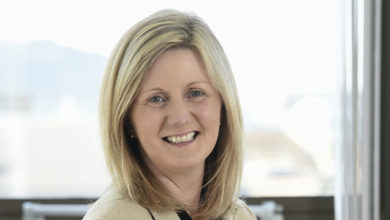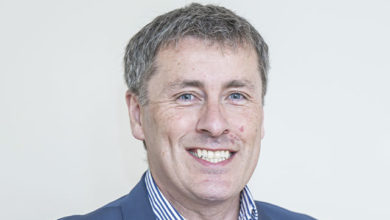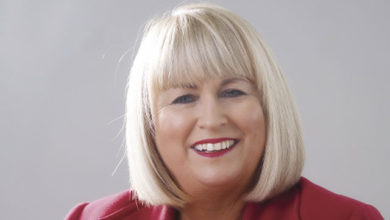The future of housing funding
 Housing associations should prioritise their cash flow, help tenants to pay their rents and take a realistic view of their finances, consultant James Tickell told delegates at the Northern Ireland Housing Conference.
Housing associations should prioritise their cash flow, help tenants to pay their rents and take a realistic view of their finances, consultant James Tickell told delegates at the Northern Ireland Housing Conference.
“I think we’re seeing the start of the end of what we call social housing,” James Tickell predicted as he outlined the funding challenges facing the sector at the Northern Ireland Housing Conference. The concept was being gradually replaced by a mixed market, already demonstrated in care and support accommodation in the community. This is also a “difficult, strange time to be thinking about borrowing money.”
James Tickell is Director of Campbell Tickell, one of the main consultancies within the UK housing sector. He was previously Deputy Chief Executive of the National Housing Federation for 10 years.
He noted that some large English housing associations were financing themselves on a five-year basis rather than over the traditional 30-year time horizon.
Housing associations across the UK faced the same problems: austerity is “here to stay,” the poorest people in society (who were often their customers) are becoming poorer, older and less healthy. Inequality was on the rise as rich became richer.
This was a “very demanding” business environment in which to set up new housing associations.
“It is getting harder for housing associations to develop and to borrow” in all four countries of the UK. Tickell added: “The new game of development is one which involves much heavier borrowing, getting much closer to the covenant grants.”
However, he also saw signs of optimism. “I do believe that the strong and well-run and innovative associations will survive,” Tickell remarked. “Others won’t.” In many of the high profile failures in England and Scotland, the associations “simply ran out of cash.”
“Managing your treasury and collecting your income are absolutely at the centre of this,” he stressed. “Values and mission are what will sort out the good organisations from the less strong ones.”
The use of private finance by housing associations is a “major success story” and the Northern Ireland sector can “take huge comfort” from the general success of transfers in Great Britain. Around one in 10 transfers has ended up in special measures at some point but the associations’ human and financial capacity was strong compared to other social enterprises.
Tickell reiterated the importance of sound financial management: “If you can’t get any income, you can’t pay back your loans and the banks know this.” Some housing associations will “essentially lose control of their income” due to welfare reform.
Housing associations were looking for a “breakthrough” in terms of controlling their unit costs. Streamlining (which regrettably could mean job losses) and responding to interest rate fluctuations would both help to improve management.
Social investment, he added, was good business and “absolutely core”. People are more likely to pay their rents if they are healthier, are in work and have lower fuel bills; supporting tenants in each of those areas therefore helps to ensure a good rental income: “The business of being a landlord is about the business of helping people to pay their rents.”
Keeping on good terms
With 12-15 lenders using different covenant obligations (a so-called “spider’s web”), it is easier to breach a covenant inadvertently and therefore run the risk of being re-priced. Both new and existing associations “have to be absolutely on top of this web of obligations.”
Discussions with lenders about re-pricing can be expected when setting up a group structure, accepting a subsidiary, changing the constitutional arrangements or borrowing extra funding. This is a normal business interaction and if covenants are breached, the cost of the loans will go up.
“It’s about relationships,” he advised. “Keep your friends close and your lenders even closer.” The key decisions by lenders may also be made overseas rather than by the association’s contacts in the bank.
Governance is also key. Banks will now look at the quality of the board and form a view on that before deciding whether or not to lend.
The board needs to “get upstream” in terms of making decisions and be strategic about getting things done: “It’s about a real focus on the skills of the board, about making sure people contribute, about investing in the personal development of board members.”
Tickell sums this up in the term ‘co-production’ i.e. the senior team of executives working more closely with the board on important strategic decisions before they come to the board. This involves genuine and “probably unstructured” discussions and more delegation to the senior team, which would then free up the board to take a more strategic view.
Boards and executives should “trust but verify” their financial information. Tickell tells chief executives to know enough about finance so that they can ask “intelligent questions” of their finance directors and understand the answers: “If you trust your finance director completely, it’s not fair to that person and that is one of the ingredients of when things go wrong.”
Complexity should be avoided and associations should have a Plan B and Plan C, including arrangements for rescuing the association if it gets into difficulty. “How can we borrow more in a hurry?” is an important question as the timescale could be as short as a week.
“Organisations that believe their own annual reports are in serious difficulty,” he warned. Tickell finds that he has to ‘whisper in the ear’ and remind clients that they are only human and not to believe their own ‘propaganda’.
Many organisations have “fantastic” risk plans but sometimes the measures taken to avoid risks can make things go wrong. He suggests that complacency is the main reason for errors along with unrealistic assumptions about inflation, property sales and interest rates. “When something goes wrong,” he added, “you can be sure that something else will go wrong too.”
Rising inequality: the long view
Tickell expects income inequality to continue to increase over the next 10 years. Housing associations “will still be here and doing a good job” but without transformation of efficiency, tenant relationships and governance, the right amount of funding will not be available.
The debate around the future of the Housing Executive is probably the biggest story in housing in Europe. “It’s a really important thing to get right and we have to be optimists,” he continued. “It’s going to be really tough. It’s going to get tougher.”
Vision is needed to access the funding markets and to improve the lives of the people whom associations are serving.





